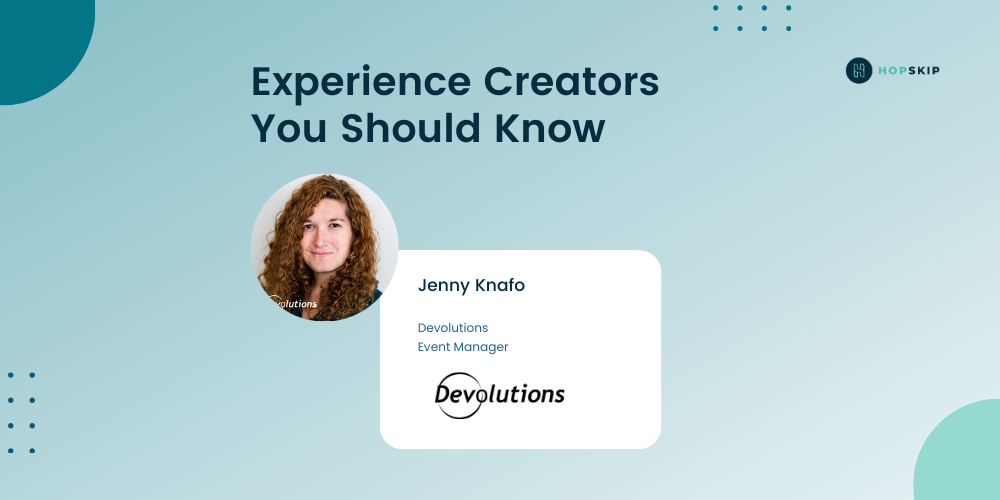Experience Creators You Should Know -Jenny Knafo, Devolutions
Jenny Knafo, of Devolutions, discusses how she honed her skills over the pandemic to now be in position to overcome the challenges that the new meetings/events landscape brings.
Luke Whalin
Nov 30, 2023

This post is part of the HopSkip Planner Spotlight Series where HopSkip spotlights planners across the industry to bring awareness of how they adapted to COVID-19, communicating and lessons learned and sharing how they are viewing the meetings and events industry in a post-pandemic world.
Name: Jenny Knafo
Company Name: Devolutions
Job Title: Events Manager
Years of Experience: 7
How did you get your start in the events industry? What made you pursue this role?
Our company decided to start an event department and I jumped on the opportunity. My passion for people, for organization and for travelling made me the perfect fit for that position.
How would you describe your role or responsibilities as a professional event planner?
I would describe my role as "all-inclusive" or "turnkey solution". :) When it comes to events or conferences, I take care of everything from A to Z. I will take care of end-to-end planning and execution of corporate events, including conferences, tradeshows, and webinars while managing the event budgets. I will also coordinate with vendors, suppliers, and partners to negotiate contracts and oversee event logistics, including venue selection, catering, audiovisual and accommodations. But, I have more than one role at my job since I don't just organize and manage our participation in over 20 tradeshows and conferences per year, but I will also participate in the tradeshows as the greeter and technical specialist in our booth. My job never ends, and I love it!
How do you compare planning your first in-person event post-pandemic, to planning meetings/events pre- Covid? What was different and unique? What was similar?
What challenges have you faced in your work as a meeting and event planner, when working with suppliers or sourcing a venue and how did you overcome them?
I find that people are even more excited and enthusiastic about events, meetings, and conferences post-pandemic. Doing webinars and video-conferences for two years has made everyone realize that nothing can replace real contact with people.
I personally find that one of the biggest challenges and hurdles we face with every event is...shipping! I know, you didn't think that's what I was going to say, but it's every event planner's worst nightmare! When shipping our booth somewhere, it always comes with the stress of: Will it make it? Will it get stuck at the border? Did they loose it? Will it make it on time? And believe me I lived more than one nightmare having to deal with shipping.
How do you determine which vendors are best suited for your stakeholder's needs while also finding those providing competitive services at affordable rates?
When having to choose the right vendors for conferences or tradeshow I will always start by doing a lot of research online. I like to look at review and talk to other event organizers to see their experiences with different vendors. I then get in contact with multiple vendors to see what they offer, how quick they are to answer my call or email, and why their rate is higher or lower than others. A lot of research will save you a lot of headaches.
Are there any key lessons or insights that have shaped your approach to event planning over the years?
Don't let yourself become overwhelmed. It's easy to start panicking when you see this storm of things to do heading your way when starting to plan an event, believe me, I've been there! The best lesson I've learned is to take things one at a time, don't look at the whole, but take the time to look at one thing at a time, it really helps; don't let yourself drown in all the things there is to do. Make a clear to-do list with priorities and deadlines and get them done one by one.
Start early! Don't wait last minute, we start looking a year or even two in advance now when we need to book a hotel for a conference.
Are you approaching contracting with hotels differently, post-pandemic?
I think that the one thing we do differently now is that we make sure that every contract with hotel now has a clear cancellation policy in case of pandemic...lesson learned after Covid!
What is the biggest area of improvement that you think hotels can make when either responding to your RFPs or during the contract phase of your event?
Due to the pandemic, our events community had to evolve, adapt, and grow. Many planners started to embrace new technologies as a result of the pandemic. What new tech are you using today in your planning process as a result?
Since education and relationships are two major pillars in the meetings and events industry, any suggestions on how other planners can learn and network with their peers across the industry?
Answer faster - but then again, every industry is now suffering from short staff - so we have to be more understanding of their situation, and the response we would normally expect in one day can now take up to 3-4 days, if not more. Patience is key.
When the pandemic hit, we started to create our own webinars to replace conferences, and we started using Hopin, which is a platform for webinars that provides excellent service.
When going to tradeshows, I make it a point to go and talk to other booth staff, they often have their event person there. I take time to exchange with them and see how they're managing their events, see if we can exchange tips and tricks, what events they went to that was good and which one was bad. I create new business relationships everywhere I go. Of course, there's also LinkedIn, that is a great tool to keep those relationships running.